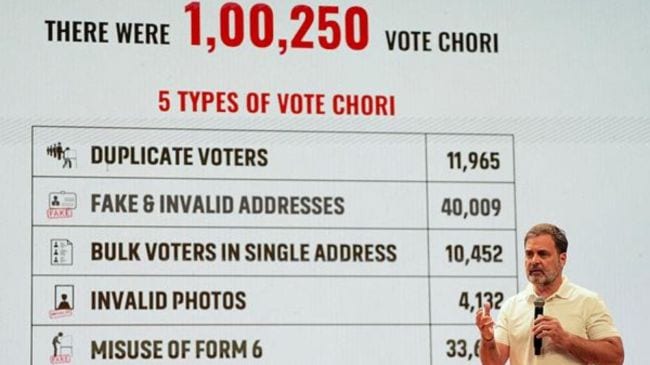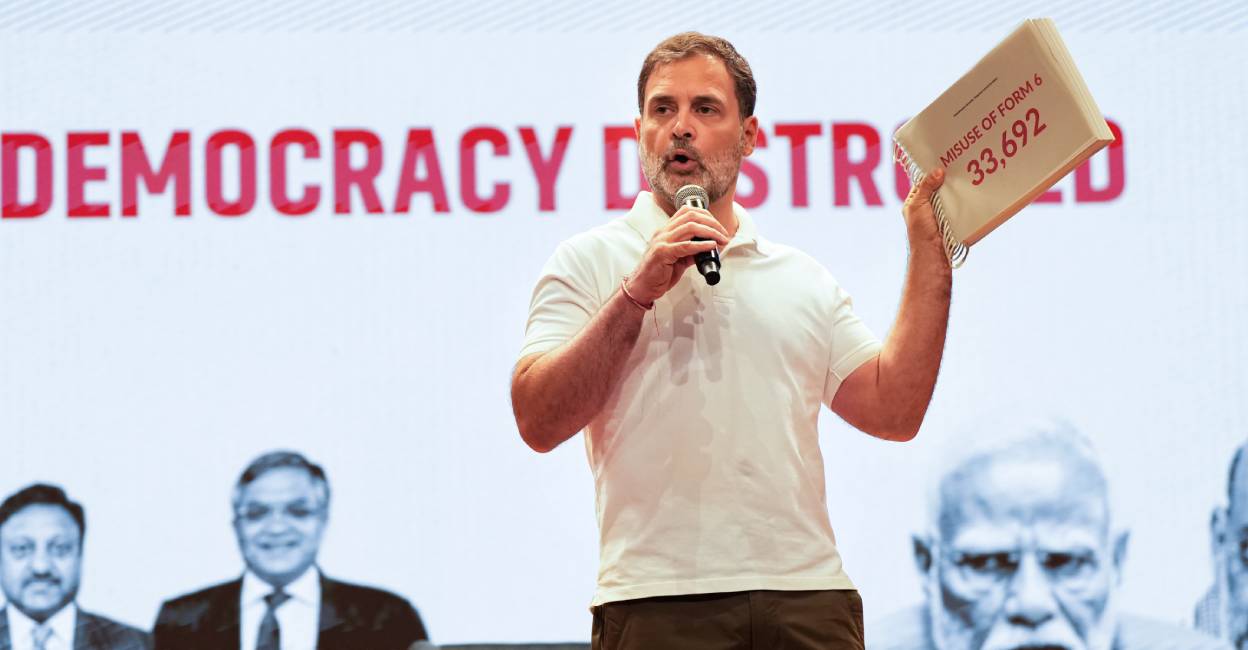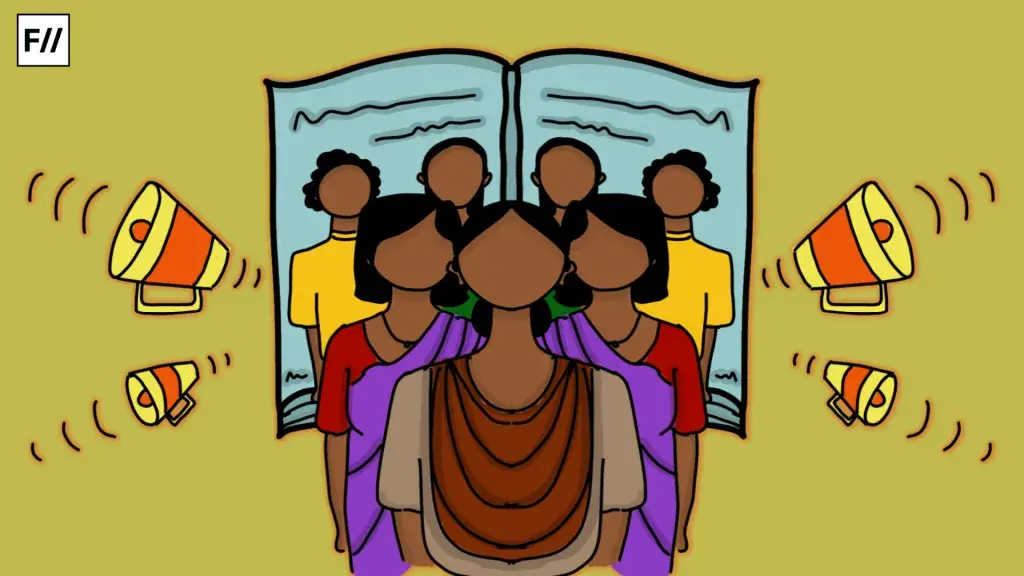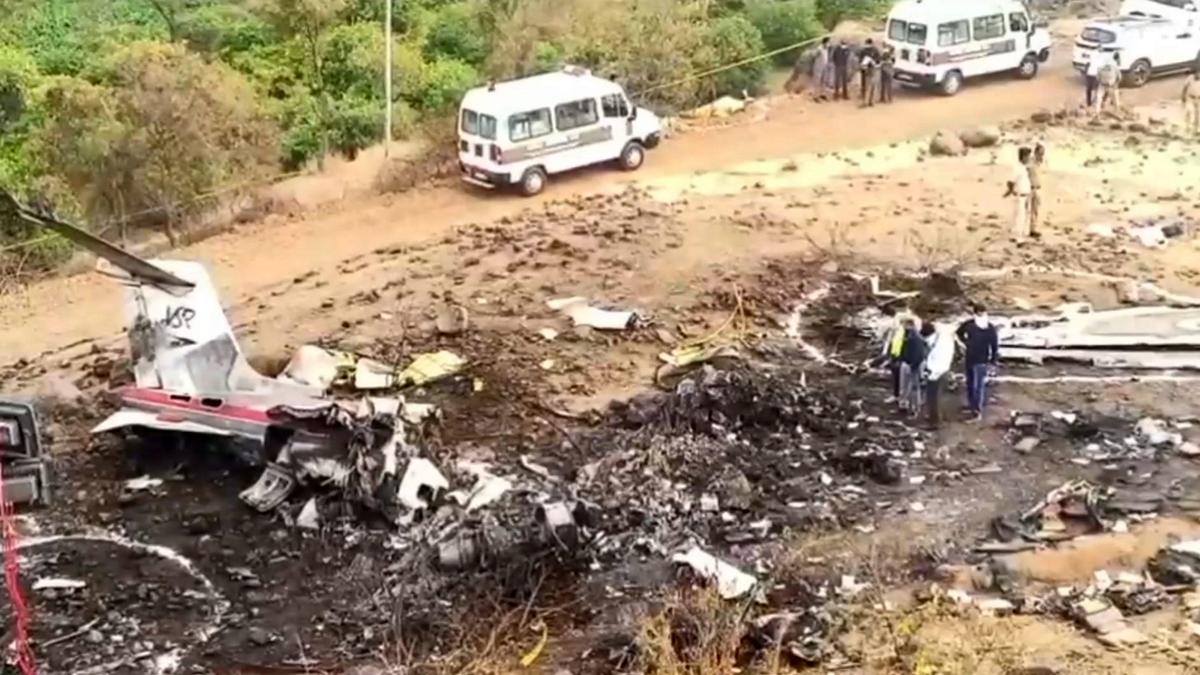Rahul Gandhi’s explosive exposé of the electoral roll fraud in the country’s last general elections and multiple state assembly elections will continue to haunt the ECI (Election Commission of India) and the ruling Bharatiya Janata Party for years. After years of ruling BJP’s concerted smear campaign of personal abuse by calling Rahul Gandhi ‘Pappu’ and maligning the leader from the biggest opposition party in India with its social media machinery, post the 2024 Lok Sabha elections and his widely known Bharat Jodo Yatra, Rahul Gandhi seemed to have come a long way from that ‘caricatured’ image. The name-calling as ‘Pappu’ was overtly used to perpetuate a sense of ‘naiveté or intellectual foolishness’ in the name-calling and abuses over his social media channels, trolls and common citizenry alike. Such attempts were smashed by the press conference where he presented the list of alleged fake voters. It initially seemed like a simple ‘turning of pages’, with a microphone in one hand and the list in the other, but as the press conference progressed, Rahul Gandhi flipped the script.
It would have been an element of surprise for the ECI and the ruling party at the centre since the Congress party was not provided with electronic data and CCTV footage, yet they managed to scour through lakhs of voters’ data to identify the fake and invalid ones. It seems to have become a personal fight for Rahul to save the country’s constitution and its democracy, while all five fingers point towards the sorry state of “democracy” in India.
The Election Commission of India and its dwindling credibility
Used in Athens, for the first time, “democracy” simply refers to ‘rule by the people’. Additionally, our middle school civics lesson prompted us to include ‘of the people, and for the people’. In any case, democracy as we see it now has taken shape through a lot of deliberations and discussions, enabling us to fathom the right from the wrong.
A research paper in 2019 by Nicholas Martin and David Picherit, focusing on electoral fraud and manipulation in India and Pakistan, substantiates the same with evidence released by the ECI. ‘Over seventy-five thousand First Instance Reports were lodged with the police in connection with different kinds of poll-related violations; over three billion rupees in cash, six and a half million litres of alcohol, and almost five hundred thousand kilos of drugs were seized’ after the 2014 elections.
Rahul Gandhi’s explosive exposé of the electoral roll fraud in the country’s last general elections and multiple state assembly elections will continue to haunt the ECI (Election Commission of India) and the ruling Bharatiya Janata Party for years as the Congress leader and Leader of the opposition in Lok Sabha, through the handiwork of their research team, brought to light an electoral fraud on a massive level.
A decade later, the Congress leader and Leader of the opposition in Lok Sabha, through the handiwork of their research team, brought to light an electoral fraud on a massive level. The Election Commission is supposedly an independent body and was once a coveted body, which was responsible for conducting elections fairly and squarely. One of the most celebrated public institutions, the EC has been under the scanner for the past decade. What once emerged as the ‘guardian of public value—free and fair elections in India’ has committed far too many mistakes for them to be overlooked. The 2019 elections proved to be a turning point for the Election Commission – a turn for the worse.
From not acting on complaints received against Prime Minister Narendra Modi and the then president of the Bharatiya Janata Party, Amit Shah, to quickly disposing of cases, giving them a clean chit, the Supreme Court had to intervene to remind the EC of its powers. The Supreme Court iterates its position by bringing forward Article 324, which states that ‘superintendence, direction and control of the preparation of the electoral rolls’ lies with the EC. They’ve also insisted that the article be interpreted ‘liberally’ in order to help the ECI carry out the tasks that they’re endowed with. The Supreme Court, as per Article 329 of the Indian Constitution, is not supposed to interfere in the electoral matters after they have been set in motion. Thus, the court’s reiteration of its ‘trust’ on the Election Commission puts a lot of power in the hands of the EC, whose credibility has been in question time and again.
De-politicisation of the ECI
According to SY Quraishi, it is the system of the appointment of the Election Commissioners that is flawed. Despite political stalwarts seeking a depoliticisation of the appointments, which is unilaterally taken on by the government of the day, the governments do not want to give up the power. Thus, political and electoral interests are deemed to be more important than national interests.

This simply goes against the very definition of democracy, ‘for the people’. The NDA, having secured 293 seats, and the INDIA coalition, having secured 234 seats, in the 2024 Lok Sabha Elections, the ruling dispensation are equally responsible to those who did not “vote” for them, since they work for the people. If the electoral majority is to simply ensure the interests of the “winning” dispensation, the entire basis of a “democratic” nation is at stake.
Whilst no factual evidence has been provided to discredit Rahul’s claims by the EC, they have replaced the digital voter lists in Bihar with the ‘scanned copies’, which makes it harder to look for mistakes.
Given the “voter fraud”, the Election Commission has asked Rahul Gandhi to either sign a declaration or apologise to the nation for a faulty analysis. Whilst no factual evidence has been provided to discredit Rahul’s claims by the EC, they have replaced the digital voter lists in Bihar with the ‘scanned copies’, which makes it harder to look for mistakes. Without having any good reason for doing so, rather than simply suggesting foul play, Digital India goes for a toss. Narendra Modi, when speaking about Digital India, said, ‘When the intent is right, innovation empowers the less empowered. When the approach is inclusive, technology brings change to the lives of those on the margins. Instead of making voter lists available in its digital format, the Election Commission is disregarding the Universal Adult Franchise by making the lists immune to scrutiny. This not only jeopardises the votes of every legal adult but also dismantles the trust in the electoral process – the very basis of a democratic nation.
The “other” pillars of democracy
Votingis an integral pillar of a democratic state. What happens when the act of “voting” is itself in question? Protests have remained the cornerstone of a democracy. On 11th August, 2025, the opposition parties of the INDIA Bloc took out a protest march to the Election Commission of India, given the alleged ‘Vote Chori’ and the revision of electoral rolls in Bihar. The march towards the ECI led to the detention of several MPs by the Delhi Police. When “voting” becomes the only mark of a “democracy”, the other methods of having our voices heard seem to become “democratic”. The infamous Delhi Police have often taken brazen decisions against protestors, ruining the essence of a “democratic” nation. Their barbaric actions against students during the protests regarding the Citizenship Amendment Act remain as evidence of the same.

The media, often termed as the fourth pillar of democracy, has been compromised, and in a run-up to the 2024 elections, prominent channels predicted a decisive victory for the BJP. This not only helps sway public opinion, but they also hold no place for the contrary. The global capture of media outlets by respective ruling dispensations not only reduced “democracy” to the act of “voting” but also encouraged quiet subservience. Given the ‘sold-out’ media channels, the focus from the alleged ‘voter fraud’ witnessed a shift to the ‘removal of stray dogs in Delhi to shelters’.
While espousing the causes for justice for stray dogs is essential to the country’s terrain, the alleged ‘voter fraud’ leaves an indelible mark on the landscape of Indian democracy. It is pertinent for the Election Commission of India to look beyond its political interests and maintain the transparency in order to gain the lost trust of the Indian populace. We have not forgotten the footage of the returning officer of the Chandigarh mayoral polls, who was caught manipulating ballot papers. Accountability and transparency should be inherent to the electoral processes but the ECI’s order to delete any footage post the 45-day election window denies the same.






